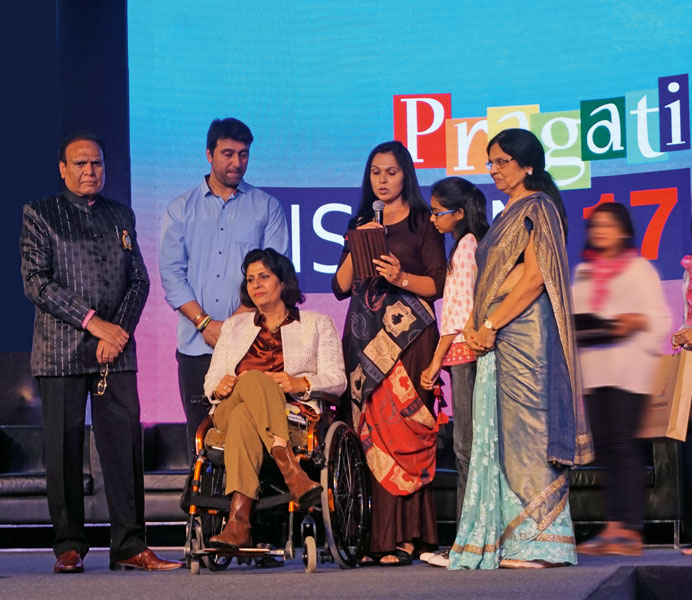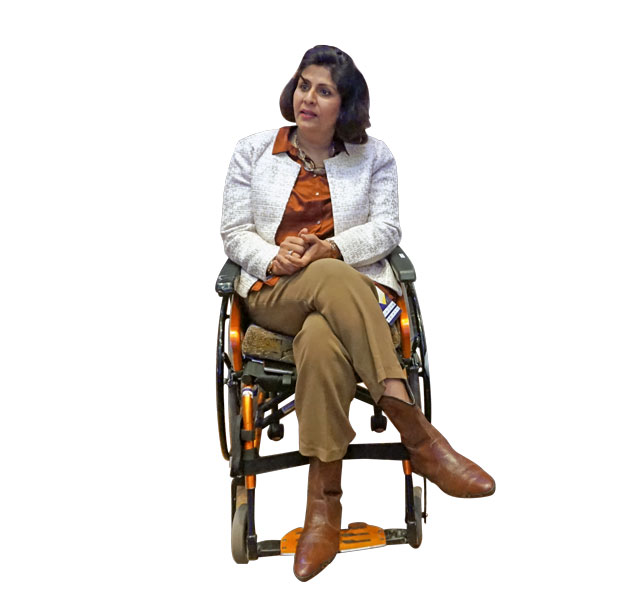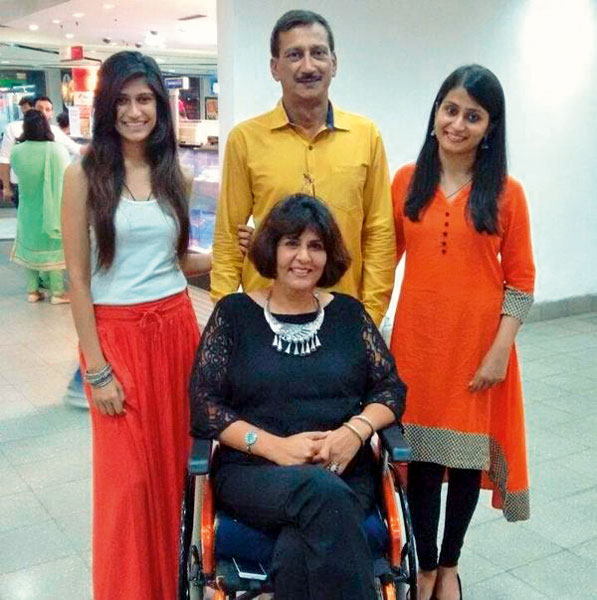Ability beyond Disability Read the incredible saga of Deepa Malik, a Paralympic medallist, who defied all odds and challenges to emerge victorious and create history for India at the Rio Paralympics.

Log kehtey hei apang ho gayi, I say rajyog aa gaya (People say she is crippled; I say I have become royalty). Did you see how I got carried onto the stage like a queen? Fayde hi fayde hei ji (There are only advantages). Now nobody asks me to sit on a two wheeler; a car is always brought for me. I’m never sent by trains, I only get air tickets. And during demonetisation, I never had to stand in ATM queues. Kyo ki hum jaha pahunch jaate hei, line wahi se shuroo ho jati hei (The queue begins where
I am stationed).”
With these words the feisty Deepa Malik, the first Indian woman to get a silver medal in athletics in the Rio Paralympics, held the packed hall spellbound at the District 3141 Conference in Mumbai.
Listening to her speech laced with humour, confidence and optimism, you forgot that she was a paraplegic confined to a wheelchair. She made the huge pile of challenges she has faced in her life, right from the age of 5, appear as mere blips as she related her story, which is filled with spinal tumours, over 30 surgeries, loss of bladder and bowel control, all of which she faced with grit, determination and optimism, emerging a champion in all senses of the word.
When only five, she was diagnosed with a spine tumour and admitted to the Pune Command Hospital, where she was bedridden for almost 18 months. This was in 1975, and the diagnosis took so long as there were no CT scans or MRIs; “it took the doctors 7 or 8 very painful lumbar punctures to make the diagnosis, but I was finally operated for the tumour and underwent a lot of rehab training.”
With no cable TV, Play Stations or video games, and too young to read books, “I heard a lot of stories from my family members. And these stories taught me so much; because in all stories, everything is good at first, next come the problems and challenges and then come the solutions and there is always a happy ending.”
From the other side came the reply from my husband, who was fighting the Kargil war. ‘Don’t worry about the legs. Over. I will.
So at an impressionable age, the child learnt that life is all about struggles for which solutions have to be found. “And if you have hope, faith and ideas, you can live happily ever after. That is something I learnt as a six-year-old!” She also learnt the art of gratitude.
In three years, she was able to walk again and the disability was a matter of the past. Years flew by and she grew up to love outdoor games and sports, and fell in love with bikes. So much so that even the very basis of her marriage was a bike. “I said I will marry the man who will give me a bike; my husband walked up to my father and said I will gift her a bike and I married him!”
A fairy-tale marriage began; in 18 months they got a daughter Devika. But one fateful day, when the child was just 14 months and was learning to walk, the house door remained open by mistake, the little girl walked through it and was knocked down by a vehicle on the road. She sustained a head injury, had internal bleeding and was paralysed on the left side. “I took her back to the same hospital — Pune Command — and my father said it is now your turn to be the parents we were to you.”

Deepa took the problem head on, but what was most hurtful were loose and cruel comments from people “Maa ki bimari thi beti ko lag gayi. (The daughter got the mother’s ailment).” She courageously decided to have a second child “more to prove to the world that I can have a normal child”. Ambika came into their lives, and as she grew up, Devika started improving too.
Meanwhile, her husband was selected for the defence services staff course in Ooty, but after Deepa reached Ooty, the pain in her legs returned. She was losing balance, especially on the slopes and hilly areas, and “in the cold I would feel my legs getting spastic.
I found it difficult to bend down, lift the children or give them a bath. I knew something was going wrong in my body but as it was a prestigious course and only for 10 months, I didn’t want to disturb him and continued to live with the pain.”
I had two choices; to give up, cry, be sad and throw tantrums, get into depression and feel it was the end of the road for me. Or to take charge of the situation. I took the second option.
Meanwhile, a beauty contest was announced promising designer clothing, hair do and make up, and she seized the opportunity to get all that. She participated, went to the stage, exuded confidence, told Haryanvi jokes and made it to the final 10. “If I was losing marks in my walk, I was making them up with my talent. When she reached the final 10, in the judges round, “I was asked, you have a slight limp when you walk and yet you are in a beauty contest. Why? I said no medical problem will stop me from feeling beautiful. And I did end up winning the crown that evening!”
But the problem persisted; her husband finished his course and was posted to Kargil. Switch over to 1999; as the Kargil war was on, doctors once again found tumours in Deepa’s spinal column. She required immediate surgery and was transferred to the RR Hospial in Delhi. “With one child already under rehabilitation, the younger girl only 3 and my husband away in a war, I had two choices; to give up, cry, be sad and throw tantrums, get into depression and feel it was the end of the road for me. Or to take charge of the situation. I took the second option, made arrangements for my paralysed body at my home by putting away my jewellery in the locker, packed up all the crystals, made my house accident-free, employed extra help and prepared for the paralysis ahead.”
She went back to the hospital and told the doctors she hadn’t spoken to her husband for two months as a war was on. “I told them I want to go into surgery knowing that he is alive. Can that be done?” She was taken to the radio room which was for the war casualties who were being flown into the RR Hospital. “From there I spoke to my husband. It was a very awkward situation. I said: ‘Hello Vikram. Over. They are taking me into surgery. Over. They say I will never walk again. Over. From the other side came the reply. ‘Don’t worry about the legs. Over. I will carry you in my arms all my life. Over. Just don’t die on me. Over.’”

As predicted, she was paralysed after surgery. “Today I do not have torso balance, can’t raise both my arms together, only my arms and neck are functional, between the shoulder blades I have undergone three major surgeries which have left 200 stitches in my spinal column.” Regular follow up treatment is necessary for the tumours and the biggest challenge is that “I don’t have bladder and bowel control. Every drop of water I drink has to be measured. If I drink too much, I can wet my diapers, and embarrass myself. If I don’t drink enough I can end up with urinary infection or collapsed bladder for which I have to be taken to the hospital.”
Similarly, if she doesn’t eat the right kind of food and balance her diet she can have a running stomach and embarrass herself. “If I don’t eat rice, I can have constipation and have to be again taken to the hospital for extraction of stools with the help of enema. That is the kind of life I live day-to-day and it has been like this for over 17 years,” Deepa said, leaving many an eye moist in the audience.
I have chosen to look at my life as half full, not half empty. I don’t crib about what I don’t have and celebrate life every day with what I have. I have adapted, accepted the change, because the only thing permanent in life is change.
But she perked up immediately and added: “There are so many medical excuses and problems but I think I look hot!” Spontaneously there were many responses from the hall: “You do, you do”, as she added, “And I still continue to feel beautiful. I strongly believe that people look at you the way you look at yourself. And I have chosen to look at my life as half full, not half empty. I don’t crib about what I don’t have. Rather I celebrate life every day with what I have. I have adapted, accepted the change, because the only thing permanent in life is change. Those who resist change resist progress.”
With her lower body paralysed, she decided to work hard with her upper body, but had to constantly face hurtful comments from people around her. The first comment was will she be a good mother. Will she ever cook for and feed her daughters? “So much so that the teachers started opening the tiffin boxes of my daughters to check if they were being fed properly. This news reached me and I felt very hurt that people were talking about my incompetence as a mother. Ek patni haar sakti hei, ek behen, beti, bahu haar sakti hei; lekin ek ma nahi haar sakti (A wife, sister, daughter, daughter-in-law can lose, but not a mother).”
She responded by starting a garden restaurant for underprivileged children in Ahmednagar in Maharashtra, where she was first recognised and feted by the local Rotary club. She started a project to fund the education of 40 children, who acted as catering/delivery boys in the evenings. “We started with four tables and ended with 40; people asked will she be able to feed two girls; I am now feeding 400 people every day. They said I will not be able to educate my daughters. I educated 80 children and rehabilitated them. And yet people would still ask me how’s your health! And this when I get up early in the morning and work till late night to run the restaurant!”
So she told herself she had to do more and return to her hobbies of car racing and motor cycling. But when she wanted to return to biking, she was told she’d have to strengthen her shoulders for which swimming and hydro therapy were necessary. “When people saw me swimming, they said why don’t you swim for the country, join sports. I was 36 years old and who joins sports at 36? But when opportunity knocks at your door, winners are those who find the courage to walk through the door.”
She decided to learn serious swimming, went to a national meet, did three different strokes and won three gold medals. More important, added Deepa, these medals helped her in getting CSR funds to achieve her mission of ability beyond disability, in which the first step was to become a biker, create Limca records in swimming, biking and car racing, and that too in Leh, Ladakh.
Her achievements include two different categories of riding a special bike for 55 km at a stretch. She has also backstroked against the Yamuna currents for a km. “The coach said they don’t allow people in my disability category to take up open river water swimming and it had never been done in India before. I had to get special permission to convince him, and at the Yamuna banks people gathered wondering how I would swim with paralysed legs, but I did it.”
But with no heated pools available to continue her training in swimming in the winters, essential for competing in international swimming, she decided to become an athlete which was easier for her body. “So at the age of 39, for the first time I held a javelin, shot put and discus, which was a good move and got me several medals.”
To do all this, particularly car racing at high altitudes in Leh, several permissions had to be got and policies changed. Deepa fought for all this and emerged a winner.
Deepa concluded her talk going back to little Devika Malik who had been paralysed by a road accident. Showing photographs of her getting a Young Leader’s Award from the Queen of England, she said proudly: “She has a limp when she walks; yes, the left half of her body is slightly shorter than the right, but her spirits are not short. She has learnt to give back to society. She has taken the concept of sports beyond competition and has got a scholarship becoming the first ever Indian girl to do a PhD in Disability Psychology, and was invited for lunch by the Prime Minister of India.”
Pictures by Rasheeda Bhagat
